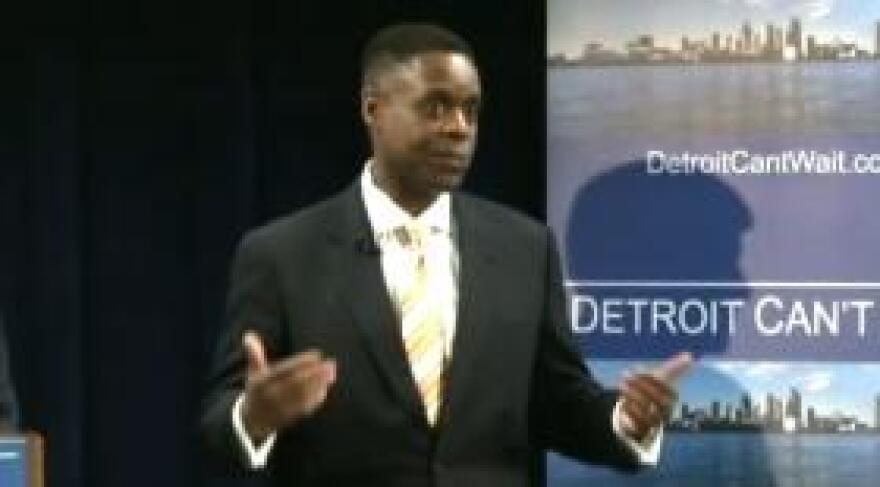Detroit emergency manager Kevyn Orr took the stand again Tuesday in the 22nd day of the city’s bankruptcy trial.
Orr testified mostly about Detroit’s recent settlement with bond insurer Financial Guaranty Insurance Corporation. That deal is outlined in a draft of the ninth version of Detroit’s plan of adjustment (the city’s proposal to “adjust” its debts in bankruptcy court).
Orr outlined for Judge Steven Rhodes how the FGIC settlement was worked out in closed-door mediation. Here’s more from Sandra Svoboda at Next Chapter Detroit, a Michigan Radio partner in the Detroit Journalism Cooperative:
The federal mediators, including Chief U.S. District Judge Gerald Rosen, were involved, as well as Mayor Mike Duggan. “I made a pledge, which I wanted to keep, with the mayor to work with him and his team to go through an effective transition,” Orr said. “I felt I no longer had the authority under the statute to deal with city property, but I felt as a matter of prudence, it was important to have the mayor’s team involved.” Gov. Rick Snyder’s controversial staff member, Richard Baird, also was at the table, Orr said, because the city did not have much left to offer the bond insurer in a settlement on their $1.1 billion claim. “It became clear that something of that value as going to have to be in-kind as opposed to debt or cash, and we were going to need the state to provide certain kinds of programs,” Orr said.
That “something of value” is the right to re-develop the riverfront real estate where Joe Louis Arena now stands. The building is scheduled to be demolished, at state expense, in 2017.
FGIC will also get “credits” toward potential future purchases of other city assets, as well as payment in notes the city will issue post-bankruptcy.
When questioned by Judge Orr about the value of the Joe Louis real estate, Orr told him that the property “has no current value or even negotiated value:”
Judge Rhodes replied, “Just to translate that into slightly different language, the city’s position is that the costs associated with attempting to market all of that property either equals or exceeds what the city could sell it for in the market?” “Yes,” Orr said, “Because you have to demolish it. You have to remediate it, so that’s true, your Honor,” Orr said.
By settling with FGIC, Detroit got rid of its last major holdout creditor in the bankruptcy case—and another obstacle to a speedy, unobstructed resolution, including a potential appeal if Judge Rhodes approves the plan of adjustment.
The company had a claim on more than $1 billion for insuring a complex deal involving the city’s pension debt. The deal itself was legally questionable, and the city had in fact sued its own pension funds on those grounds.
However, with the settlement the city has agreed to dismiss the lawsuit as all sides back away from litigation. Orr said that if Detroit lost that case, the repercussions could be “fairly catastrophic.”
Another revelation in court Tuesday: the city will include, in the new version of its plan of adjustment, a plan to sell copper for scrap.
Detroit has a longstanding problem with thieves scrapping copper and other metals from its infrastructure.
But now, the city has apparently decided to take a page from the thieves’ book, and sell copper wire from its public lighting system.
Again from Next Chapter Detroit:
[Ernst & Young financial consultant Gaurav] Malhotra testified that the city could reap $5 million next year from selling 13.5 million pounds of copper wire — $25 million over six years — as the public lighting department is decommissioned. “It’s the wire that exists both overhead and underground,” Malhotra said.
The trial is should wrap up next week with closing statements. Judge Rhodes is expected to decide whether the plan of adjustment meets the terms of the municipal bankruptcy code, and issue his ruling, early next month.





